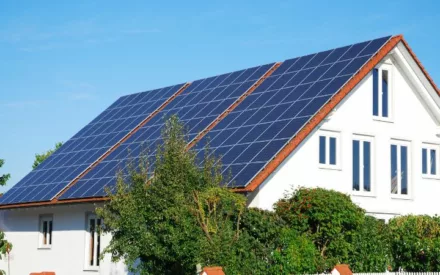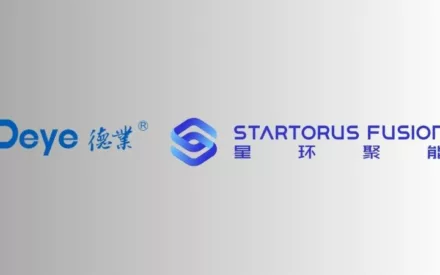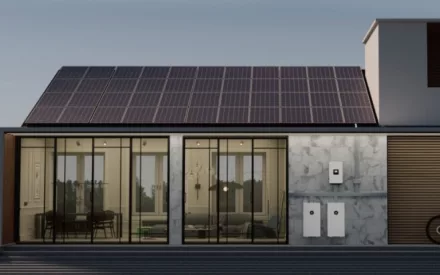HV vs. LV Solar Batteries: Choosing the Right Energy Storage Solution
Solar batteries are a key component of home energy systems. They store power from solar panels for use when the sun isn’t shining. When choosing a solar battery, voltage is an important factor to consider.
High voltage (HV) and low voltage (LV) solar batteries are both designed for energy storage, but they cater to different needs. LV batteries are ideal for smaller-scale systems, like residential solar setups, while HV batteries are better suited for larger installations and backup power applications.
This blog will explore the key differences between these two types of batteries to help you determine which is the best choice for your home solar energy storage needs.
Understanding Voltage in Solar Batteries
Voltage is a key factor in solar battery systems. It affects how much power can be stored and used. Different voltage levels suit different needs and setups.
- What is Voltage?
Voltage in batteries is like water pressure in pipes. Higher voltage means more “pressure” to push electricity through a system. This allows more power to flow quickly. In solar systems, voltage comes from the panels and batteries. It’s measured in volts (V).
Low voltage is like a gentle stream. High voltage is more like a fire hose. The amount of water (or electricity) might be the same, but it moves differently. This difference affects how solar systems work and what they can power.
- High Voltage Batteries
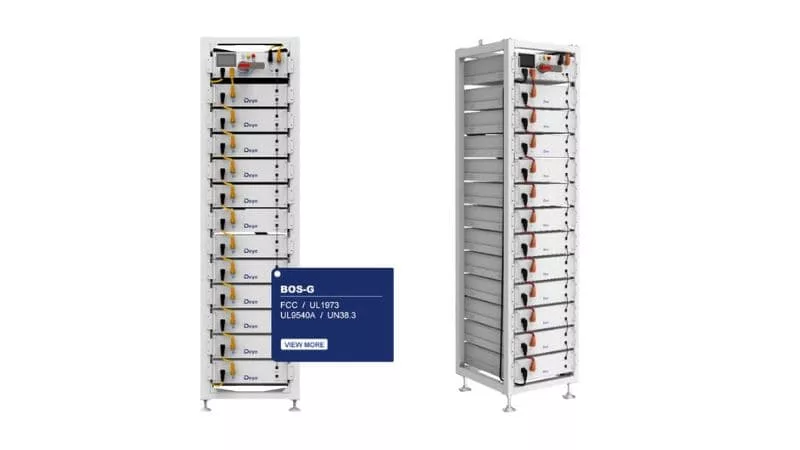
High voltage solar batteries, operating above 48V (some exceeding 400V), offer advantages like higher power output, suitability for larger loads, and thinner wiring, resulting in reduced energy loss. However, they come with a higher upfront cost, more complex installation, and require additional safety precautions.
- Low Voltage Batteries
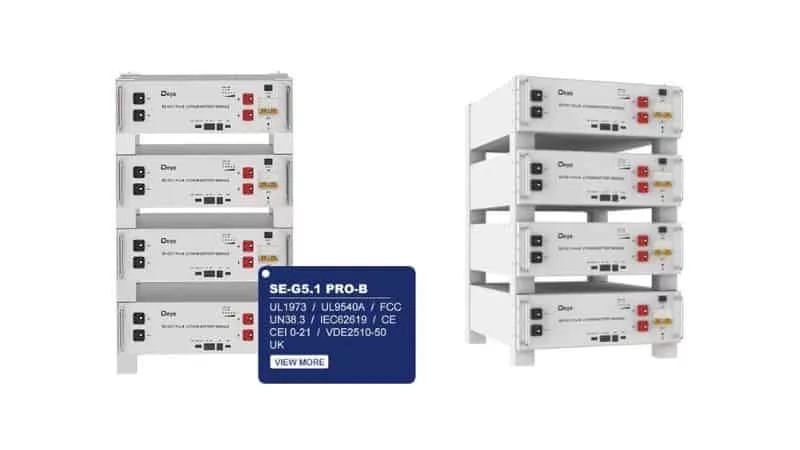
Low voltage batteries, operating between 12V and 48V, are safer to handle, simpler to install, and more affordable. They are ideal for smaller to medium-sized systems like residential installations, RVs, and boats.
Low voltage has limits though. They may struggle with high power needs and need thicker wires for long distances. Many people choose low voltage for their first solar setup because they easily expand the batteries as needs increase.
Comparing High Voltage and Low Voltage Solar Batteries
Solar batteries come in high and low voltage options. Each type has its own pros and cons for home energy storage. Let’s look at how they differ:
| Feature | High Voltage (HV) | Low Voltage (LV) |
| Energy Density | Higher; more energy in a smaller space (160V-700V) | Lower; requires more batteries for same energy storage (12V-48V) |
| Space Requirements | Smaller footprint for larger energy storage | Larger footprint for same energy storage |
| Suitability | Large homes/businesses, large solar arrays | Smaller homes, off-grid setups, backup power |
| Safety Concerns | Higher risk of electrical shock; requires specialized training for installation | Lower risk of electrical shock; less specialized installation |
| System Efficiency | Higher efficiency; less energy loss as heat | Lower efficiency; more energy loss as heat |
| Compatibility with Solar Installations | Compatible with larger solar arrays | Compatible with smaller solar arrays |
| Cost Implications | Higher upfront cost, potentially lower long-term cost for large systems | Lower upfront cost, potentially higher long-term cost for large systems |
Applications and Use Cases
High voltage and low voltage solar batteries have their specific uses in different settings respectively. The choice depends on the energy needs and scale of the project.
- Residential Use
Low voltage solar batteries are common in homes. They work well with small to medium-sized solar panel systems. These batteries usually range from 12V to 48V. They’re easy to install and maintain.
Homeowners use them to store extra solar power during the day. At night or on cloudy days, this stored energy powers the house. This cuts electricity bills and provides backup during outages.
Low voltage batteries are safer for home use. They’re less risky if something goes wrong. Many homes don’t need the high power of larger systems.
- Commercial Use
Businesses often choose high voltage solar batteries. These batteries, around 400V, suit larger energy needs. They’re great for office buildings, schools, and shopping centers.
High voltage systems are more efficient. They lose less energy when moving power over distances. This matters in big buildings with spread-out energy use.
These batteries can handle fast charging and discharging. That’s helpful for businesses with changing energy needs throughout the day. They also take up less space, which is good for businesses with limited room.
- Industrial Use
Industries use high voltage solar batteries for heavy-duty tasks. These batteries power large machines and whole factories. They’re key in places that need constant, reliable energy.
High voltage systems shine in industrial settings. They can store and release huge amounts of power quickly. This helps during peak production times or power outages.
Many industries pair these batteries with large solar arrays. This combo cuts energy costs and helps meet green energy goals. It also provides a backup power source for critical operations.
- Off-Grid Solutions
Both high and low voltage batteries have roles in off-grid systems. Low voltage batteries are popular for small off-grid setups. They’re used in RVs, boats, and remote cabins. These systems are simple and don’t need special skills to set up. They’re perfect for basic power needs like lights and small appliances.
For larger off-grid projects, high voltage batteries work better. They can power whole communities or remote facilities. These batteries store more energy in less space. This is crucial when building a self-sufficient power system far from the grid.
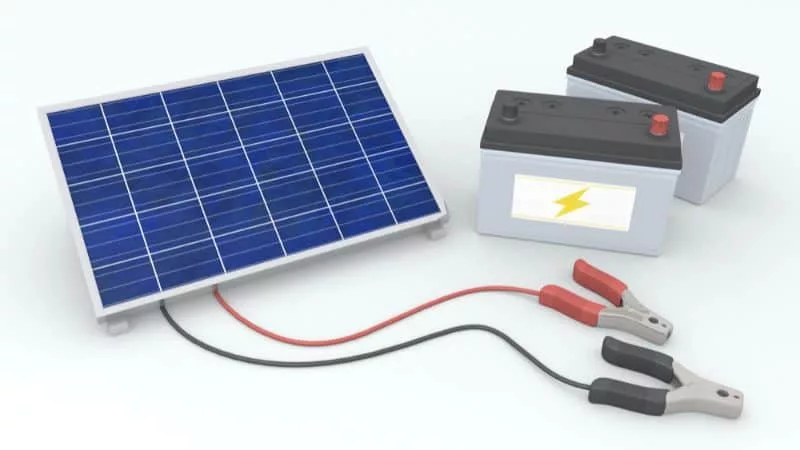
Factors to Consider When Choosing a Home Battery
Before purchasing solar batteries, you should first consider your energy needs, costs, and how well the battery works with other parts.
- Energy Consumption and Load Demands
Look at daily power needs and peak usage times. This helps decide the right battery size and type.
For small homes with low energy use, a low voltage battery might work well. Larger homes or those with high power needs may need a high voltage system.
Think about future energy needs too. A growing family or new appliances can increase power use. Choose a battery that can handle current and future demands.
- Cost and Installation Complexity
Battery prices vary widely. High voltage systems often cost more upfront but may save money over time. Low voltage batteries can be cheaper to buy and install.
Installation costs matter too. Low voltage systems are often easier and cheaper to put in. They may not need special safety gear or expert installers. However, high voltage systems can be more complex to install. They might need extra safety measures and skilled technicians. This can add to the total cost.
Think about long-term value. A pricier system might pay off if it lasts longer or works better.
- Compatibility with Inverter and Other System Components
The battery must work well with other parts of the solar system. This includes the inverter, charge controller, and solar panels.
Check if the battery voltage matches the inverter. Some inverters work with both high and low voltage. Others are made for just one type. Look at how the battery connects to the whole system. Make sure it fits with existing or planned parts.
Consider future upgrades. A battery that allows for easy expansion can be a smart choice. It lets you add more storage as needs change. And remember to check local rules. Some areas have limits on battery voltage for home use.
Lifespan and Durability
High voltage batteries often last longer. They can handle more charge cycles. Many last 10-15 years or more with proper care. Low voltage batteries may have shorter lifespans. Lead-acid types might need replacement after 5-7 years. Lithium-ion versions can last 10 years or more.
Climate affects battery life. Extreme heat or cold can harm both types. High voltage systems often have better temperature control.
Deep discharges can shorten battery life. High voltage setups usually manage this better. They spread the load across more cells. And warranty terms differ between types. High voltage batteries often have longer warranties, which means better long-term value for homeowners.
Finding the Right Solar Battery for Your Needs in Deye ESS
Deye ESS is a leading manufacturer in PV systems, providing high-quality energy storage products for residential, commercial, and utility applications. We offer both high-voltage (HV) and low-voltage (LV) solar battery solutions.
To determine the best solar battery solution for your needs, consider the size of your solar system, your energy consumption, and your budget. We have a range of products designed to meet your various requirements. Contact Us directly to discuss your specific needs.


